When you are looking to sell a commercial property quickly, there are a few things you can do to help speed up the process. Here are some tips to help get the job done. The quicker you can find a buyer and close the deal, the better. Follow the article and sell commercial property in no time.
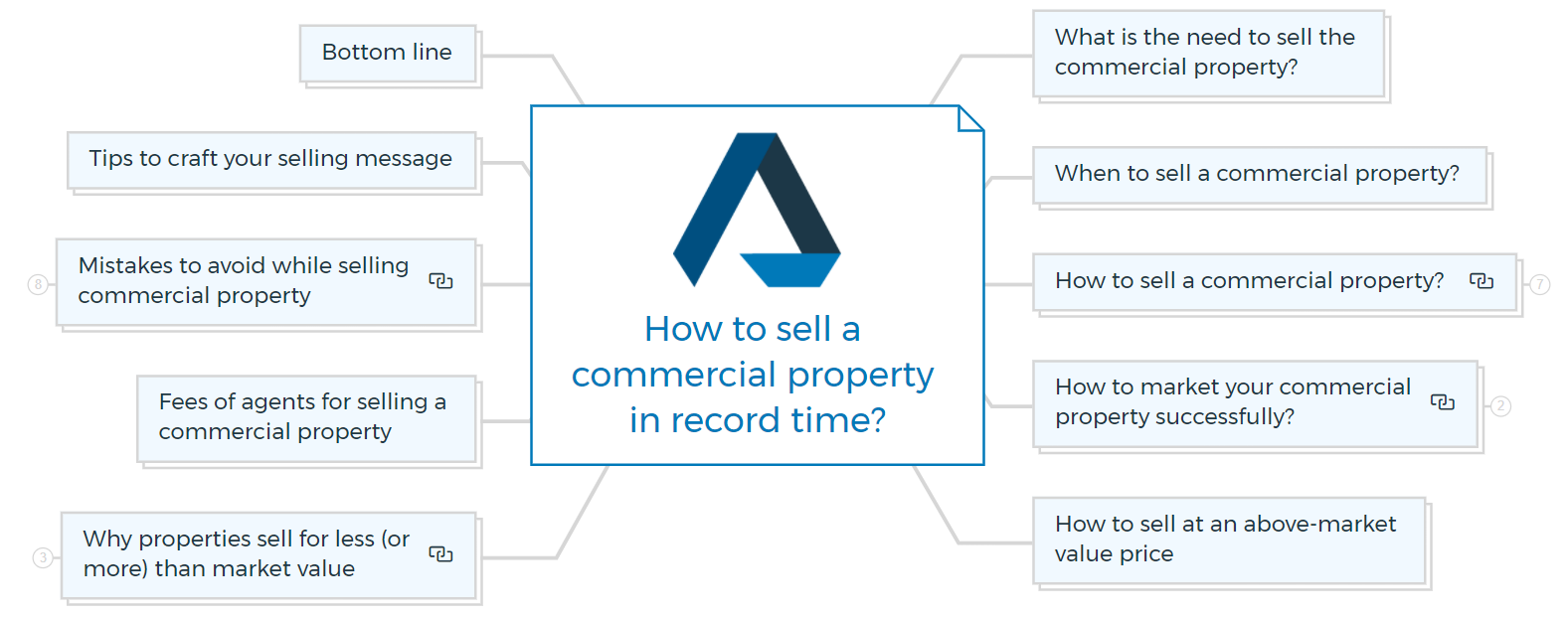
What is the need to sell the commercial property?
The consensus is that commercial property is a long-term investment with regular income and capital growth. On the other hand, people's needs fluctuate throughout time. What was once an intriguing investment may become less tempting several years down the road for various reasons. As a result, you may determine that selling is necessary.
For example, you may require the part (or all) of the funds you've invested right now. Or maybe you get a deal that is too wonderful to pass up. You may believe that property values are about to fall and that you should sell now.
When to sell a commercial property?
When it comes to selling a commercial property, however, there are several obvious factors to consider, and the smart real estate investor should be aware of them:
1. You can 'up value' (increase the proportionate value) of plant and equipment when you buy a property, even if it isn't brand new, as long as the contract doesn't specify a particular written-down value for these components. It might provide you with significant depreciation benefits during the first few years of property ownership.
Plant and equipment (carpets, cabling, light fixtures, elevators, heating and air conditioning) deteriorate faster than other assets. Depreciation is higher in the first few years of ownership. You can claim most of that type of depreciation after five or six years.
Ensure that the purchase contract does not include a value for the plant and equipment when purchasing the property. It will protect you from overvaluing those highly depreciable components. When it comes time to sell, though, it's just as crucial to reflect their written-down worth in the contract.
If the new owner decides to up value the plant and equipment again, you could face a balancing charge from the Tax Office. As a result, this could be the tipping point for you to sell, especially if you've recently renewed a five-year lease on better terms, increasing the property's value.
2. You may discover that an older property (that you own) requires significant structural or capital improvements. The roof, for example, may need to be replaced. If you don't have the cash on hand, selling the property and passing these charges on to the new owner may be preferable.
3. You may own a home in an area with considered zoning or road network modifications. If the lease has fewer than two years left, it may be conceivable to sell the property to an owner-occupier who is anxious to take advantage of the improvements' 'blue-sky' potential.
In reality, you may not implement the proposed adjustments. However, for as long as they appear to be a possibility, they could make your house incredibly enticing to a specific qualified buyer, potentially resulting in a significant cash gain upon its sale.
How to sell a commercial property?
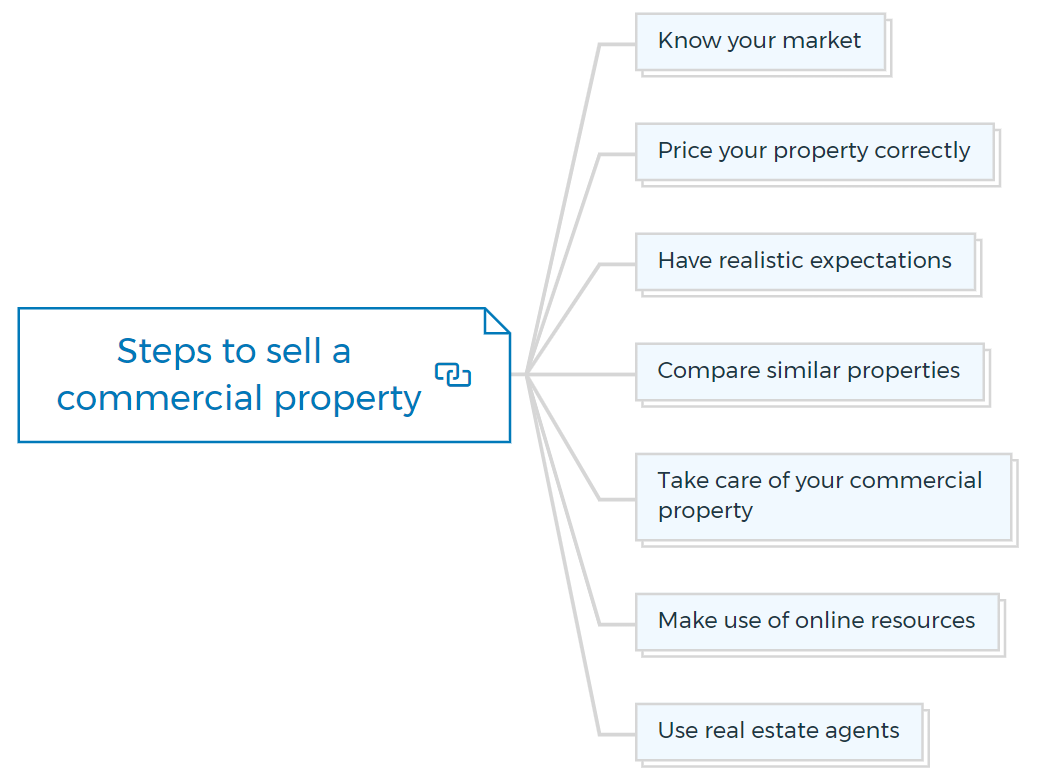
Know your market
Who is your target audience, and what are they looking for in a property?
It's essential to have a clear idea of your target audience when selling commercial real estate. Once you know this, you can tailor your marketing and sales strategy accordingly.
You should also be aware of what features and amenities are most important to your target market - for example if you're targeting businesses, then access to major highways or public transportation may be key selling points.
Finally, always remember that time is of the essence when selling commercial property. The sooner you get your property on the market, the better returns you will get. So be prepared to act quickly when a potential buyer expresses interest.
Price your property correctly
Don't overprice or Under-price, and make sure to factor in all associated costs
Accurately pricing your property is one of the most critical aspects of selling commercial real estate fast. If you overprice your commercial property, purchasers will move on to another option. On the other hand, if you price your property too low, you may not get the total value of your investment.
When pricing your property, it's crucial to find the right balance and factor in all associated costs. It includes marketing costs, repair/renovation costs, and commissions.
The best way to price your property correctly is to consult with a professional real estate agent who has experience selling commercial real estate in your area. They will understand the market and give you an accurate valuation of your property.
Have realistic expectations
Be prepared for offers that may not meet your asking price
When selling properties, it's essential to have realistic expectations. In most cases, you won't get the total asking price for your property. However, this doesn't mean that you shouldn't accept any offers; consider every offer, no matter how low or high it is.
By being flexible and open to negotiation, you may be able to get closer to your asking price than you thought possible.
Many commercial real estate transactions are less glamorous than high-rise office complexes. Farms, light industrial structures, small retail stores, and vacant land zoned are the reasons for most of your commercial real estate sales. Expect to visit farms and talk about livestock more than large office properties.
Compare similar properties
See what's selling and for how much to get an idea of your competition
During the sale of commercial real estate, it's important to compare your property to similar ones in the area. It will give you an idea of your competition and the average price of similar properties in the current market.
It's also an excellent way to see what features and amenities are most important to a potential buyer. By understanding your competition, you can tailor your selling strategy accordingly.
If you're not sure where to start, check out listings on popular real estate websites or ask a local real estate agent for help. Once you've gathered comparable properties data, you can price your property accordingly and start marketing it to potential buyers.
Take great care of your commercial property
Keep it clean and well-maintained to attract buyers
When you are trying to sell a commercial property, it is important to keep it clean and well-maintained. This will make it more appealing to potential buyers and help you get a better price for your property. Here are some tips on how to keep your commercial property in top condition:
- Hire a professional cleaning company to regularly clean the premises.
- Make sure the common areas are always tidy and free of debris.
- Repair any broken or damaged fixtures and fittings immediately.
- Keep the landscaping around the property well-maintained.
- If there is any graffiti or vandalism, have it removed immediately.
Make use of online resources
Create a website or listing with high-quality photos and detailed information about the property
In today's digital age, it's more important than ever to use online resources when selling commercial real estate property online. It includes creating a website or listing that features high-quality photos and detailed information about the property.
Potential buyers will be much more likely to take an interest if they can easily find all the information they need in one place. Using these resources, you can reach a larger audience and speed up the selling process.
Use real estate agents
They have the experience to sell commercial property fast at the best price possible
Real estate agents have the experience and expertise to help you sell your property quickly and at the best price possible. Plus, they can handle all the paperwork and negotiations for you. While there may be a fee involved, it's worth it to get your property sold fast and for top dollar.
Your realtor should be able to discuss the present situation of the market in detail and provide estimates for the property's potential price. However, these experts may provide a lot more to a home seller. A skilled agent should also be able to:
- Collect and compile all required information to ensure that potential investors are entirely educated and capable of making an informed buying decision.
- Communicate with you and your lawyers to ensure that the paperwork is complete and accurate.
- Send out brochures and letters (or, more likely, personal emails) to those possible qualified buyers who are known to be on the market right now.
- Attempt to get editorial coverage in the many media outlets you can utilise.
- Qualify all of the leads that come in as a result of the marketing campaign
- Arrange for various inspections to be conducted.
- Get potential bidders ready for the actual auction
- Keep you up to date on the progress at least once a week
- Ensure to do all the preparations for a smooth auction day.
- Organise the auction and oversee the signing of contracts with the winning bidders
- Check in with your real estate attorneys to ensure the completion of documents to their satisfaction.

Get The Edge Now!
Discover the transformative power of our FREE EDGE platform and
unlock a world of opportunities at no cost!

Your Real Estate Toolkit Awaits!
Free eBooks, Courses & Feasibility Suite Trial—Join Today!
✓ Unlimited FREE Trial: Experience the full power of our Feasibility Suite with hands-on demos
—explore without limits, no time pressure & without commitment or credit card!
✓ Learn from Success: Dive into real-life case studies for practical insights.
✓ Engage, Inquire, and Innovate: Ask questions, request features, and engage in lively discussions.
✓ Showcase Your Projects and Gain Insights: Share your projects and get personalised feedback.
✓ Free Resources Galore: Access a treasure trove of free resources,
eBooks & courses to keep you informed.
✓ Exclusive Training: Enjoy members-only training to sharpen your skills.
How to market your commercial property successfully?
If you've ever sold a house, you'll know that in the competitive market of real estate, each of the numerous commercial brokers you speak with will claim to have the effective recent sales technique. In reality, they don't have a straightforward approach.
The following is a marketing strategy that most developers, investors, and experienced brokers have used for great success. It is a strategy for achieving the best possible result by creatively targeting investors, developers, and potential owner-occupiers and implementing a broad yet cost-effective marketing campaign that will attract the most qualified purchasers for your property.

Selecting a method of sale
The key to successfully marketing any property is to make potential purchasers feel they could be missing out. However, in the case of a straight, private transaction, this is extremely difficult to execute.
In reality, a private sale may take longer to produce a result because this method of selling fails to elicit any sense of urgency in the buyer's mind.
Another problem is that choosing an 'asking price' puts you at a disadvantage. Traditionally, you'd need to inflate this number to account for the expected level of negotiation, but this can be a double-edged sword.
Because the figure is so much above their initial expectations, you may be able to discourage potential customers effectively. It might also go the other way: you could end up selling for less than what purchasers would have been willing to pay if they were under the strain of competitive bidding.
As a result, a well-publicised public auction is frequently the best sale form. That way, all potential purchasers are working toward the same deadline, and you won't have to announce a selling price publicly. You may keep control of this method.
An advertising approach
As you may be aware, media advertising can be rather pricey, and there is a limit to how much information you can convey about a property in a single campaign. Experts' strategy is to link media ads to dedicated internet pages for each property they sell or lease, which is highly effective.
Most agents choose to list their properties on the internet in a generic manner, for as on portal sites. Following this course may result in the difficulty of going through a lengthy search process on one or more websites for every buyer looking for such homes.
What's worse for you as a seller is that while you're doing so, purchasers may find several other properties that they prefer instead!
Experts found that creating numerous dedicated web pages for your property on our website and promoting that unique web address in media ads, brochures, and posters works best. It means that qualified buyers can zoom in on your home and see and download a lot more information about it.
You can give a complete description of the property (across several pages), give facts about the location, and lay out the property's inherent merits by using dedicated websites. You can also upload photos of the outside and inside of the building.
In most cases, you'll need to spend 1.0 to 1.5 percent of the anticipated selling price on marketing your home. However, as shown, sellers can obtain an even better result while saving money by using this innovative, web-based technique.
Why properties sell for less (or more) than market value
Market value sales in real estate specifies the below criteria -
- Both buyers and sellers usually want to make a deal. Neither acts under duress.
- Both buyers and sellers have a good understanding of the property and market.
- The marketing time frame and sales promotion efforts are enough to let potential buyers know that the property is for sale (i.e., no forced or rushed sales).
- There are no unusual terms of purchase, such as a low down payment, all cash, or an interest rate that is lower than the market rate.
- Neither the seller nor the buyer makes any unusual concessions, like letting the seller stay in the house rent-free for three to six months while their new house is being built or making their offer contingent on the sale of their current home.
If the owner needs to sell quickly, they may have to settle for less than the market value. Also, a "for sale by owner" (FSBO) seller who doesn't know how to market and promote a property probably won't get top dollar.
Or, let's say the sellers live somewhere else. They don't know that recent sales prices have gone up, or maybe they don't know that their property (or the area around it) is a great place to make some money-making improvements.
Below are some situation/reasons when people sell property at different price than the market value -
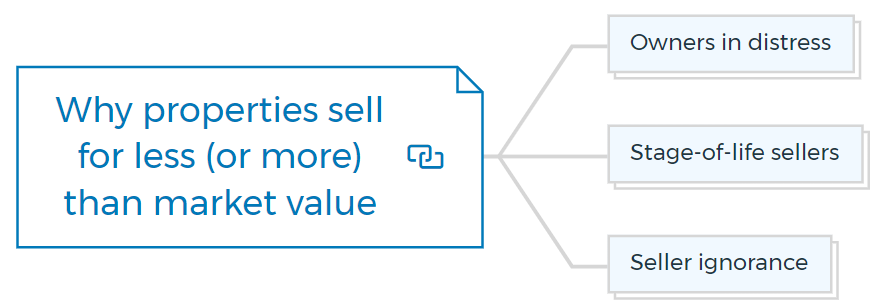
Owners in distress
People go through hard times every day, and news stories show this in a very clear way. They lose their jobs, get divorced, get hurt or sick, have setbacks in their businesses, fall behind on their car loans, credit card payments, and mortgage payments, and a whole host of other problems hit them like a freight train.
Any of these disasters can make it hard to pay the bills. For many of these people, the only way out of their problems is to sell their property quickly at a low price to get cash.
Some investors don't like to take advantage of the poor. But owners who are having trouble paying their bills want to get rid of their restless nights. If that means they have to sell their home for "less than it's worth," they are willing to do that.
People don't just sell a house to these people; they buy relief. If the sellers feel they have benefited more from the transaction than they have lost, then it is a win-win situation for both of them.
If you want to help people deal with hard times instead of taking advantage of them, look for owners in distress and will sell you their property at a low price or on good terms.
Stage-of-life sellers
If you want to buy something for less than the market price, look for deals from sellers in different stages of life. Some of these sellers are people whose lifestyles no longer fit with their homes. They might not like having a big house or yard, getting rent, or dealing with complaints from tenants anymore.
No matter why they want to sell, stage-of-life sellers want to move on with their lives. Also, sellers in this stage of life have usually built up a lot of equity in their homes, which makes them good candidates for a good deal on price or terms.
And because they are older, they might have saved or invested a lot of money. Sellers in a certain stage of life are open to offers. They don't have to get every last penny from their sale or keep all of the money from the deal. Because sellers in this stage of life often don't need cash right away, they are great candidates for OWC (owner will carry) financing.
Not only will OWC terms help them sell their property faster, but an installment sale also reduces or delays the capital gain taxes that might be triggered by a cash sale.
Another benefit of OWC financing is that it often gives sellers a higher cash income return than a savings account, certificate of deposit, bonds, money market fund, or stocks. This is true even when the interest rates are below market rates.
Seller ignorance
Some people underprice their homes because they don't know what similar homes have been selling for in the past few months. Or they don't know of a unique benefit that makes their property stand out in a good way.
Sometimes sellers do it by accident, and sometimes they do it on purpose. Keep your eyes open for this chance. Jump on a good deal when you see one. Properties that are priced too low often sell quickly.
Even though good deals go quickly, not all properties that are cheap are good deals. A good deal is only good if you can sell the property for a lot more than what you put into it. Watch out for long-term markets that are going down, where a price that seems low today will be even lower tomorrow.
Also, make sure you have a good idea of how much it will cost to fix any hidden problems or environmental issues, such as lead paint, underground oil storage tanks, asbestos, or contaminated well water. Split up your money. Keep your improvements in line with what your potential renters can and are willing to pay.
Do a thorough physical, financial, market, legal, and feasibility analysis of a bargained-priced property before you decide to buy it. Take your time with seller financing that requires little or no money down. Don't give in to the urge to jump without looking.
Fees of agents for selling a commercial property
When you sell a property successfully, agents usually charge 2.0 to 3.0% (plus GST) of the actual amount that appears on the contract, depending on the valuation.
On the other hand, a flat-fee deal isn't always in your best interests. Some agents frequently offer incentive-based fees, in which the percentage charged climbs in proportion to the property's sale price. As a result, the agent has a stronger motivation to achieve the feasible price.
A typical incentive-based fee scale for a new property expected to sell for $840,000 to $860,000 could look like this.
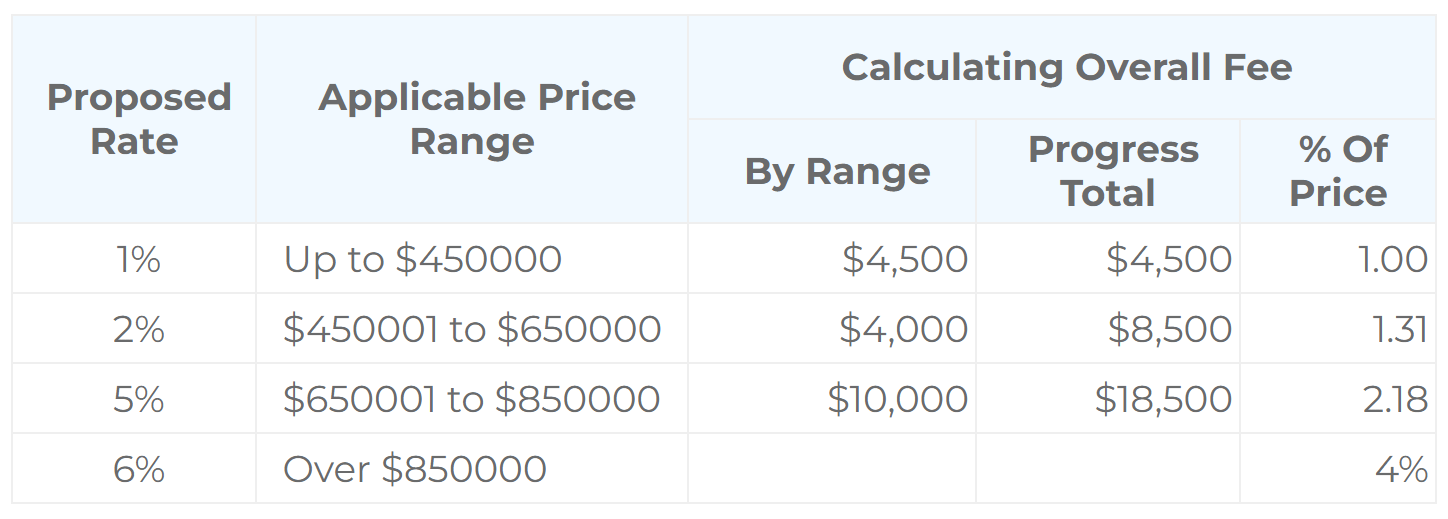
Hopefully, this has given you some insight into promoting your business property effectively when the time comes.
Mistakes to avoid while selling commercial property
When it comes time to sell your commercial property, there are a few things you should avoid doing at all costs. I've outlined the biggest mistakes below, so you can make sure to steer clear of them!
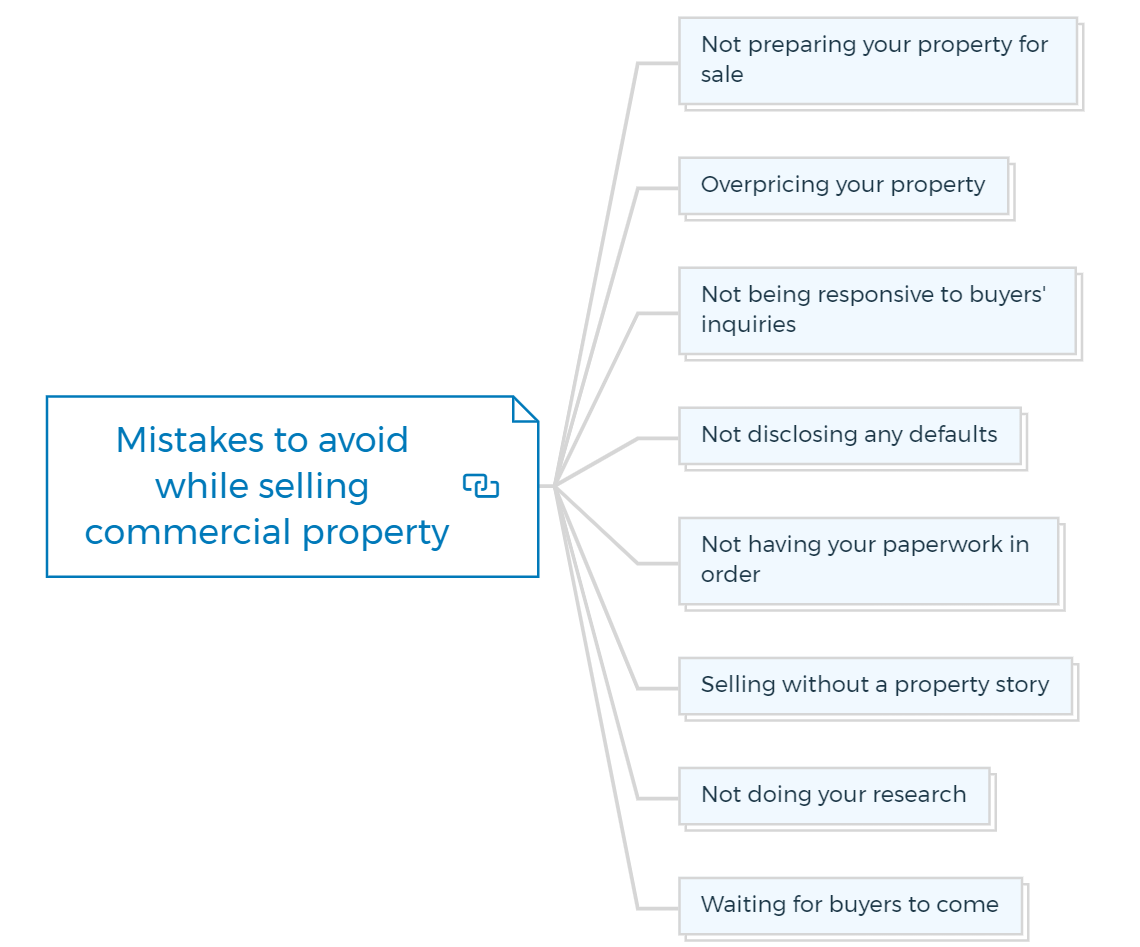
Not preparing your property for sale
One of the biggest mistakes sellers make is not adequately preparing their properties for sale. It means ensuring that the interior and exterior are in excellent condition and that all necessary paperwork is in order.
If you're not prepared, potential buyers may be turned off by your property and choose to buy from one of your competitors instead.
Overpricing your property
Another common mistake that sellers make is pricing their property too high. It can often lead to a more comprehensive sale process, and it may end up selling for less than if it had been priced correctly from the beginning.
It's important to remember that buyers are looking for the best deal possible, so pricing your property too high will likely turn them away.
Not being responsive to buyers' inquiries
Finally, one of the worst things you can do as a seller is not responsive to buyers' inquiries. If potential buyers are interested in your property, you should respond to their questions as quickly as possible to keep them interested.
Failing to do so could lead to them losing interest and buying from one of your competitors instead.
Not disclosing any defaults
When you're selling a property, it's essential to disclose any defaults that may exist. It includes things like outstanding loans or leases that are in place.
If you fail to disclose any of this information, it could lead to commercial real estate investors backing out of the sale or suing you after the fact.
Not having your paperwork in order
It means making sure all of your Title Deeds, Encumbrances, and other legal documents are up to date and ready to go. If not organised, it could cause delays in the sale process and lead to potential clients losing interest.
Selling without a property story
When selling commercial properties, it's essential to have a good story to tell potential buyers. It means highlighting all of the positive aspects of your commercial real estate and making sure that it stands out from the competition.
If property owners can't sell their property with a good story, it will be harder to find someone interested in buying it.
Not doing your research
Finally, sellers' most significant mistake is not researching before putting their commercial real estate properties up for sale. Meaning that you are learning as much about the current market conditions and what buyers are looking for.
By doing your research, you'll be able to price your property correctly and make it more appealing to prospective buyers.
Waiting for buyers to come
Many sellers mistake waiting for buyers to come to them instead of actively pursuing potential buyers. It often leads to a more comprehensive sale process and can cause property owners to miss out on potential deals.
It's essential to be proactive and reach out to as many likely buyers as possible to find the right buyer for your property.
By avoiding these mistakes, you'll put yourself in a much better position to sell your commercial real estate quickly and for the best price possible.
Tips to craft your selling message
To sell properties well, you need to put some thought and work into it. To sell at the best price possible, you need to come up with a great value proposition and then tell everyone about it. You can't sit around and wait for people to find you.
When I say, "Tell the world about it," I mean make a sales message that gets people's attention, gets them interested, makes them want it, and makes them want to do something about it.
How will you reach this goal? Use the 10 guidelines below:
- Use a catchier lead or title
- Reiterate and explain
- Add more of the most popular benefits
- Build your reputation
- Look at what else is out there
- Arouse emotions
- Lower perceived risks
- Make it easy for people to respond
- Give people reasons to act now.
- Follow up
You might say, "Wait a minute!" "How can I put all of that information into a sales message? I just want a four-line ad in the paper." You could also say, "I'm not going to sell "by the owner." I'll leave advertising and sales to my real estate agent." True, most sellers don't say much about their property in their print or online ads.
Instead, they just list a few facts and hope that people will call to find out more. But in a sea of ads, yours needs to stand out, make the prospect want to call, and then you need to know what to say when the phone rings. "Just the basic facts" is not usually a good way to sell.
It probably won't get you an offer that's as good as what you could get if your sales message was more convincing. When it comes to working with sales agents, you should never forget that it's your job to oversee, direct, and give feedback on their sales efforts. Even sales people who make a lot of money don't always make good sales presentations.
What makes sense makes sense in the real world. When you make your sales message (ads, flyers, brochures, personal selling, networks, word of mouth, etc.) with all 10 principles of effective selling in mind, you will close more deals on better terms.
Bottom line
The bottom line is that if you own a commercial property, there may come a time when you need to sell it. When that time comes, it's essential to know how to do it to get the best return on your investment property.
Luckily, I've outlined the above simple steps for doing just that and some major mistakes to avoid.
For the successful marketing of your commercial properties, you'll need a knowledgeable agent. Ensure that your sales representative understands the market thoroughly and is well-versed in the most cutting-edge marketing strategies.
You may not be able to afford to buy a retail centre or commercial building on your own, but joining a private property syndicate will put you in the 'big league.'
Did you find this blog post helpful? Be sure to check back for more helpful articles related to commercial real estate property.
FAQs

